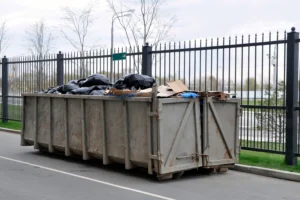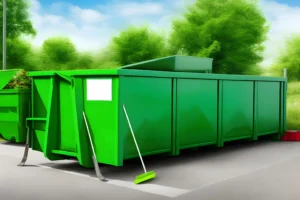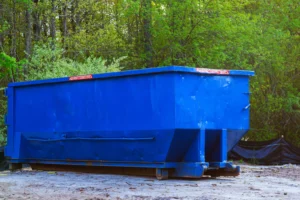In the state of New Jersey, there are stringent regulations governing the disposal of certain items and materials in dumpsters. These regulations are in place to ensure the safety of the public, protect the environment, and promote responsible waste management practices. It is crucial for residents, businesses, and organizations to understand and comply with these regulations to avoid penalties and contribute to a cleaner and healthier New Jersey. Let’s delve into greater detail regarding the items and materials that are typically prohibited from being placed in dumpsters, providing examples for each category:
Hazardous Waste: Dumpsters must never be used for the disposal of hazardous waste materials. Hazardous waste encompasses substances that are flammable, corrosive, toxic, or reactive. Examples of hazardous waste that should never find their way into dumpsters include:
a. Batteries: Whether they are automotive batteries or household batteries, these contain hazardous materials such as lead, sulfuric acid, and mercury. They should be taken to designated battery recycling centers or retailers that offer battery disposal services.
b. Pesticides: These chemicals, which are used to control pests, insects, and weeds, can be harmful to both human health and the environment. Proper disposal methods involve contacting local hazardous waste collection programs or agricultural extension services for guidance.
c. Motor Oil: Used motor oil is considered hazardous waste due to its potential to contaminate water bodies and soil. It can be recycled at auto parts stores, service stations, or dedicated oil recycling facilities.

Don’t put these items in the dumpster!
d. Paint and Solvents: Products such as paints, thinners, varnishes, and similar items contain harmful chemicals. They should be disposed of at household hazardous waste collection events or designated drop-off locations.
e. Cleaning Chemicals: Household cleaners, bleach, and other cleaning products that contain chemicals should never be placed in dumpsters. These chemicals can be harmful if they enter the water supply or come into contact with other waste materials.
f. Asbestos-Containing Materials: Asbestos is an extremely hazardous material that can cause severe respiratory diseases and cancer. Materials containing asbestos, such as insulation, tiles, and roofing materials, must be handled by certified asbestos abatement contractors and disposed of in specialized facilities.
g. Electronic Waste (E-waste): Discarded electronic devices, including computers, televisions, smartphones, and other electronic equipment, should not be discarded in dumpsters. E-waste contains harmful substances like lead, mercury, and cadmium that require specialized recycling methods.
Medical Waste: It is strictly prohibited to dispose of medical waste in dumpsters. Medical waste includes used needles, syringes, pharmaceuticals, and biological waste. These materials pose significant health risks and must be handled and disposed of according to specific regulations. Proper disposal methods for medical waste involve using licensed medical waste disposal companies or participating in community-sponsored medical waste collection events.
Tires: Dumpsters are not designed to handle the disposal of tires. Discarded tires can create breeding grounds for pests, contribute to environmental pollution, and present fire hazards if not properly handled. Tire recycling facilities or tire retailers that offer tire disposal services should be contacted for proper tire disposal.
Appliances and Electronics: Large appliances such as refrigerators, air conditioners, washing machines, and electronic devices should not be placed in dumpsters. These items often contain hazardous components and require proper recycling. Examples of appropriate disposal methods include taking them to designated recycling facilities, participating in community e-waste recycling events, or contacting local recycling centers.
Construction Debris: Dumpsters have weight limitations and are not suitable for disposing of heavy construction debris such as concrete, bricks, large quantities of soil, or other construction materials. These materials require specialized disposal methods and should be taken to construction and demolition (C&D) recycling facilities or designated landfills for construction waste.
Asbestos Materials: Dumpsters should never be used for disposing of materials that contain asbestos. Asbestos is an incredibly hazardous substance that can cause severe health issues, including respiratory diseases and cancer. If you suspect the presence of asbestos in your property, it is crucial to hire a certified asbestos abatement contractor to handle its safe removal and disposal.
Hazardous Liquids: Dumpsters should not be utilized for disposing of hazardous liquids, such as gasoline, oil, paint thinner, and other flammable or volatile substances. These liquids can leak, causing environmental contamination and posing a fire hazard. Instead, it is crucial to handle and dispose of hazardous liquids properly. Options for disposal include taking them to designated hazardous waste collection centers or participating in local household hazardous waste collection events.
Prohibited Items: In addition to the specific categories mentioned above, local regulations and waste management guidelines may prohibit the disposal of certain additional items in dumpsters. These prohibited items can vary depending on the specific area and waste management policies. Examples of items that are often prohibited in dumpsters include:
a. Propane Tanks: Propane tanks, whether empty or partially filled, should not be placed in dumpsters. They are potentially explosive and require proper handling and recycling at designated propane tank recycling facilities.
b. Car Batteries: Similar to other batteries, car batteries contain hazardous materials and should not be disposed of in dumpsters. Many automotive retailers and recycling centers accept used car batteries for recycling.
c. Medical Equipment: Items such as medical devices, sharps containers, or medical instruments should not be placed in dumpsters. Proper disposal methods involve returning them to the healthcare facility, contacting medical waste disposal companies, or participating in specific medical equipment recycling programs.
d. Large Furniture: Dumpsters may not be suitable for disposing of bulky or oversized furniture items. It is recommended to explore other options such as donation centers, furniture recycling programs, or arranging for special pickup services offered by waste management authorities.
e. Chemical Containers: Empty or partially filled containers of chemicals, such as propane cylinders, aerosol cans, or paint cans, should not be placed in dumpsters. These containers may still contain residual hazardous substances and should be taken to appropriate recycling or disposal facilities.
It is crucial to be aware of and adhere to these regulations to protect public health, prevent environmental damage, and comply with the law. Violating these regulations may result in fines, legal consequences, and negative impacts on the environment. To properly dispose of prohibited items, residents and businesses should explore alternative disposal options such as recycling centers, designated drop-off locations, hazardous waste collection events, or contacting specialized waste disposal services for proper handling and disposal.
By following responsible waste management practices and utilizing the appropriate disposal methods for specific items and materials, individuals can contribute to a cleaner and healthier environment in New Jersey. It is important to stay informed about local regulations and consult with waste management authorities or dumpster rental service providers for a comprehensive list of prohibited items in your specific area. Together, we can ensure the proper disposal of waste materials and promote sustainable waste management practices.




